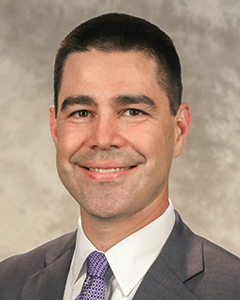
As I care for people living with serious illnesses, I often hear patients say things like, “The doctors will tell me what to do.” The truth is that delivering the very best care for each patient requires active and ongoing communication. If you do not understand what is happening with your health, it is nearly impossible to direct your care. And if your healthcare team does not understand who you are, what is important to you, and what you hope to get out of your treatments, they cannot offer the best care for you. To understand the importance of communication, let me tell you about Carol.
Carol's Story
Carol came to the Emergency Department on a Sunday evening with a nagging cough and shortness of breath that had worsened over several days. While the cause wasn’t immediately clear, when asked about her treatment goal, she responded like most healthy, younger people, “Do what you need to do to get me better.” When asked what she meant by “better,” Carol said, “Put me back the way I was before this stuff started so I can get back to my life.” When the hospitalist asked what we should do if her heart stopped beating while she was in the hospital, she said, “Well, bring me back!”
After several days of blood tests, scans and a biopsy, Carol’s medical team discovered the cause for her symptoms. They diagnosed her with pneumonia and gave her antibiotics, which helped her breathing. But, they also found something else: lung cancer, which had spread to her pelvis, ribs and spine.
A Terminal Diagnosis
After talking with Carol and discussing different treatment options, her medical team revisited Carol’s goals for her care. She told them, “My breathing feels better with these antibiotics, so I want to keep taking those to get ahead of the infection, so I can get home. As far as the cancer goes, I saw my grandpa go through chemotherapy and radiation a few years ago and it was hard on him. I know my situation is different, but if it’s going to make me too sick to do the things I want to do, I might decide to spend the time with my family and focus on my comfort.” Carol planned to talk with her new cancer team after she left the hospital and then decide.
Through discussions with her care team, Carol learned her cancer increased the risk for complications, like blood clots, which could be unpredictable and possibly severe or even fatal. While meeting with her social worker, Darius, she shared thoughts that kept her up the night before. Carol wondered what would happen if she had a blood clot in her brain and couldn’t talk to her doctors or understand them? What if she was in a coma and didn’t wake up again? What would happen to her?
Make Wishes Known
Darius helped Carol complete a healthcare durable power of attorney (DPOA), a form that let her decide who she wanted to make her healthcare decisions, if she was unable to herself.
Carol identified her brother, Steve, and sister, Jane, who she acknowledged for their support. “They have been really great. They help me talk with my doctors and process afterwards to make sense out of everything. They know how I feel about things, so they know what I want. I also know my brother can get overwhelmed with difficult conversations because he’s so sensitive. I worry he might not be able to carry out my wishes. My sister has always been the rock in our family, and I know I could trust her to do what I wanted, even if she disagreed with my choice.”
Darius agreed that Jane would be a good choice for Carol’s DPOA, and Carol’s friend, Justin, named as an alternate. She felt Justin would follow her wishes. Darius encouraged Carol to make sure Jane and Justin knew her decision and make sure they were comfortable in their roles.
Darius also helped Carol complete an advance directive–a form that let her decide what she would or would not want done to keep her body alive longer after her doctors determined she was in a terminal or unrecoverable state, such as a coma, where she would not recover. In completing the form, Carol shared her feelings, “When it’s my time, I’m ready to go. I don’t want my doctors keeping my body alive with machines and tubes just to keep me around.”
Involve Healthcare Providers
Later that day, when her hospitalist revisited the question of how best to support her if something caused her heart to stop while in the hospital, Carol said, “I heard with this advanced cancer, the chance they could even restart my heart is low, maybe 5% or even less. With the cancer in my ribs, I worry about the fractures if they did CPR. I don’t think that would be good for me.” She asked that her code status change to “do not attempt resuscitation” or “DNR.” She wanted her care team to focus on keeping her comfortable if anything happened that caused her heart to stop. Her hospitalist also suggested she complete an outside the hospital do not resuscitate form, so she could have this same protection at home.
Carol’s experience shares several lessons:
- Our understanding about our health can change quickly and unexpectedly. On Sunday, Carol described herself as a healthy person with years ahead to explore and enjoy. By Wednesday, she was confronting a new reality of cancer and thinking how it might affect her quality of life and her time left.
- As our understanding of our situation changes, our goals will change, too. In the Emergency Department, Carol expressed her willingness to undergo any treatment required to get her better, but on Thursday, she reflected on her grandfather’s experience and expressed concern about chemotherapy and radiation. Similarly, with more information about her situation and the likely outcomes in an attempt to restart her heart, she changed her code status from FULL CODE to DNR.
- Healthcare providers don’t know how best to treat us without understanding our goals. Just as important as Carol making her decisions was expressing them to her care team; otherwise, she may have received treatments she didn’t want or started on a plan not reflective of her goals.
- Documents like the DPOA, advance directive and outside the hospital do not resuscitate forms, are valuable tools for communicating treatment preferences to our healthcare team and our loved ones. While Carol still worried about potential complications, she rested easier knowing she took steps to ensure her wishes would be honored. She also felt better knowing she made the decisions so her loved ones would not agonize over what she would want and possibly disagree with each other.
Whether we think of ourselves as perfectly healthy or we are living with a serious illness, such as cancer or heart failure, the most important thing as a patient is to make sure your health team understands your goals for your care.
Explore More
Watch my Advance Care Planning Lunch & Learn
Read more about creating an Advance Directive.
Download the Caring Conversations: Advance Care Planning Workbook
Have the Talk



